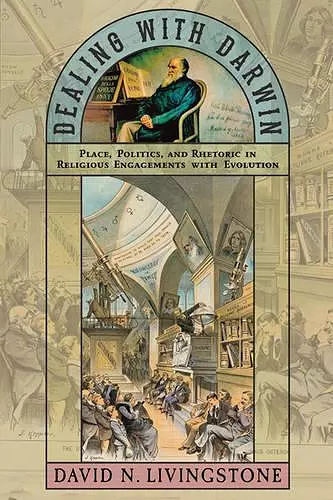Dealing with Darwin
Place, Politics, and Rhetoric in Religious Engagements with Evolution
Format:Hardback
Publisher:Johns Hopkins University Press
Published:30th May '14
Currently unavailable, and unfortunately no date known when it will be back

Livingstone's achievement shows how important local events were in shaping attitudes to and even the meaning of 'Darwinism' in communities where biological evolution, particularly the specific mechanism of natural selection, was a divisive issue. The author brings an exceptional degree of sophistication to his task, exploring ways in which different local contexts also affected what participants in these post-Darwinian debates felt able to say in public. Livingstone provides a detailed and authoritative account of the contours of debate, the careers of the respective adversaries, and the political issues that were most pressing for them. -- John Hedley Brooke, University of Oxford Dealing with Darwin is by a widely respected scholar who is clearly at the top of his game. It is an exciting and comprehensive text that will serve as a leading discussion point and intellectual signpost for the field, particularly for those interested in science and religion and in history. I am very enthusiastic about it! -- Janet Browne, Harvard University
Livingstone concludes with contemporary examples to remind us that what scientists can say and what others can hear in different venues differ today just as much as they did in the past.Using place, politics, and rhetoric as analytical tools, historical geographer David N. Livingstone investigates how religious communities sharing a Scots Presbyterian heritage engaged with Darwin and Darwinism at the turn of the twentieth century. His findings, presented as the prestigious Gifford Lectures, transform our understandings of the relationship between science and religion. The particulars of place-whether in Edinburgh, Belfast, Toronto, Princeton, or Columbia, South Carolina-shaped the response to Darwin's theories. Were they tolerated, repudiated, or welcomed? Livingstone shows how Darwin was read in different ways, with meaning distilled from Darwin's texts depending on readers' own histories-their literary genealogies and cultural preoccupations. That the theory of evolution fared differently in different places, Livingstone writes, is "exactly what Darwin might have predicted. As the theory diffused, it diverged." Dealing with Darwin shows the profound extent to which theological debates about evolution were rooted in such matters as anxieties over control of education, the politics of race relations, the nature of local scientific traditions, and challenges to traditional cultural identity. In some settings, conciliation with the new theory, even endorsement, was possible - demonstrating that attending to the specific nature of individual communities subverts an inclination to assume a single relationship between science and religion in general, evolution and Christianity in particular. Livingstone concludes with contemporary examples to remind us that what scientists can say and what others can hear in different venues differ today just as much as they did in the past.
How was Darwin's On the Origin of Species received by his contemporary scholars, particularly by theologians and religious authors? That is the subject of the thoroughly researched and elegantly written book by David N. Livingstone. -- Francisco J. Ayala Science, Religion and Culture Dealing with Darwin is a compelling account of how science is made in a process of transit. A theory such as Darwinian evolution is, after all, not a sealed package that is either accepted or rejected by its various audiences. Rather, as Livingstone's book vividly demonstrates, different versions of Darwin were appropriated, reconstituted and constructed to suit various local needs and theological or scientific contingencies. -- Gowan Dawson Journal of Historical Geography An informing and suggestive examination of the Darwinian episode. -- J. David Hoeveler Reports of the National Center for Science Education Dealing with Darwin has been many years in the making, but well worth waiting for. It is a delight to read, both from a literary and intellectual standpoint. Perspectives on Science and Christian Faith In this illuminating book, our intrepid tour guide crafts a vivid portrait of the geographical, cultural, political, and racial dynamics that have shaped and often continue to characterize debates over Darwin. Dealing with Darwin is a welcome addition to Livingstone's growing library of compelling works on religion and science, pathbreaking research that upends the way many think about the historical interplay between Darwinism and religious belief. Isis Its most original contribution is in using cultural geography to study science and religion. Its most interesting point is that reactions to Darwin were also always about something else. And finally, its most inspiring accomplishment is the way it makes microhistories serve a compelling larger argument: it is a comparative collection of local studies whose sum is more than its parts. This book is essential reading for those seeking to understand the geography, whether actual or metaphorical, of nineteenth-century science-and-religion. British Society for Literature and Science
ISBN: 9781421413266
Dimensions: 229mm x 152mm x 23mm
Weight: 522g
280 pages